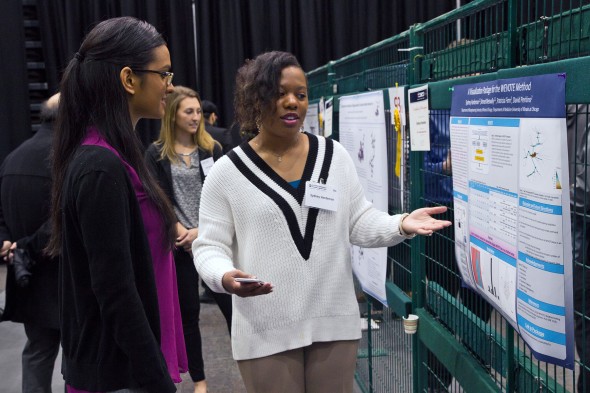Spotlight on student research

Bioengineeing student Sydney Hardeman presents her work at the Student Research Forum Monday at the UIC Forum. (Photo: Vibhu S. Rangavasan)
More than 300 students filled the UIC Forum April 3 to communicate — in just a few minutes — the importance of their months and years of work to faculty, alumni, staff and community members.
The Student Research Forum allows undergraduate, professional and graduate students to talk about their research experiences. This year, it was combined with UIC Impact Day, an event that celebrates students and their scholarly pursuits in and outside of the classroom. A total of 435 faculty, alumni and others served as judges.
Margaret Allen said presenting any research or other impactful student experience is important.
“It’s nice being able to show something that sounds pretty complicated and trying to explain it in ways that make more sense to other people,” said Allen, a junior in the College of Engineering. Her research showed how acoustic metamaterial could be used to better monitor the structural health of pipelines. “It’s been an interesting process, going through everything that I’ve worked on.”
Amaalyah Wilson, a student in business management, shared her findings on how social media affects recruitment and selection of job candidates in the hiring process.
“Seventy percent of applicants don’t get hired based on their social networking websites,” she said. “Companies are constantly looking, so it’s important for applicants to know and watch what they’re posting.”
Neuroscience major Maribel Heredia studied how hormones like estrogen mediate the effect of anoxic depolarization in strokes.
“Males and females are affected differently by strokes,” she said. “That’s why we’re looking at whether estrogen is implicated in this process. Maybe because of estrogen, females have a better outcome than males do.”
Senior Yazan Issa said he was proud to present his research on the presence of Thioflavin S plaques in the twitcher mouse model of Krabbe disease — a fatal and degenerative disorder — with a focus on the spinal cord and the peripheral nervous system.
“I love the research, I love solving the puzzle and finding the data,” he said. “It’s a way to do work that means a lot to you, and, at the same time, you know that it can really benefit a lot of people.”
